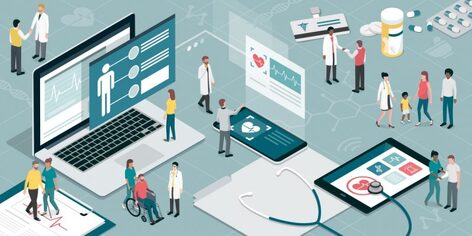The future has started
Some physicians regard big data and clinical-decision support systems and beyond the state-of-the-art. Today, applications run that efficiently process relevant data to allow physicians to spend more time on their patients.
As a matter of fact, physicians have always used big data. In the past, they reduced data in order to analyse and understand it. The disadvantage of reducing data is that valuable information will be lost before the analysis. The incremental increase of medical data is invaluable for stratified and personalized medicine. At ORTEC Health (Logiqcare) we can analyse big data, before returning specific conclusions to the physician.
Beyond human capability
Technology is developing rapidly; we yield evermore detailed relevant information. The system collects and structures patient data to educate physicians to improve patient care. Physicians could see medication use and treatment effects in a glance, of their own patients, but also from other patients all over the world. The challenge is to structure an ICT system so physicians to allow rapid and intuitive use in medical practice. Physicians want to collect all relevant data efficiently. Less time for data entry, more for the patient. That is the direction we're heading to, good news for patients and medics.
Physicians rarely reach 100% certainty but decide for the most relevant diagnosis at that moment. The ICT system calculates with all data, including data that the physician might have considered irrelevant for this diagnosis. This results in better decisions, highlighting rare conditions, beyond the structured way of thinking.
The system guides physicians through a dynamic tree structure. Physicians can structure this themselves and integrate logical steps based on previous answers. The system allows analysis of the results, so if a physician has a suboptimal working procedure that might miss some diagnosis or treatment options, analytics will show this, allowing the procedure to be improved. Historical data may also show that the treatment used in 2018 was better than the change in 2019, to evaluate and revert deteriorating changes is also progressive insight.
Physicians rarely reach 100% certainty but decide for the most relevant diagnosis at that moment. The ICT system calculates with all data, including data that the physician might have considered irrelevant for this diagnosis. This results in better decisions, highlighting rare conditions, beyond the structured way of thinking.
The system guides physicians through a dynamic tree structure. Physicians can structure this themselves and integrate logical steps based on previous answers. The system allows analysis of the results, so if a physician has a suboptimal working procedure that might miss some diagnosis or treatment options, analytics will show this, allowing the procedure to be improved. Historical data may also show that the treatment used in 2018 was better than the change in 2019, to evaluate and revert deteriorating changes is also progressive insight.
Improved hospital operations
Traditionally it would take an enormous effort of time, money to perform a clinical comparison of two groups of thousands of people with the same diagnosis. These data are obscurely present within medical information systems. ORTEC Logiqcare structures these data to allow quick analysis. It allows physicians to analyse their own populations and performance and compare these with other hospitals. Are there differences in patient populations, diagnostics, interventions or surgical procedures?
Physicians will learn from various approaches considering their performance and can improve medical care and its efficacy. If an insurance company wants to cut costs of the second scan, providing data of saved costs downstream might easily to convince them. If a test of € 100 reduced the usage of the sequential tests that costs € 1000 euro by 30%, it becomes a financial no brainer. Currently, this information is hidden within the patient information system.
Aggregates of diagnostic data can be linked to the hospital’s existing planning software, allowing to forecast predicted surgery that would occur in 40% of the patients with a given diagnosis of lung cancer. Aggregates of these anonymous data could be shared with departments providing post-surgical care. Thus, data allows better operational management in hospitals.
Physicians will learn from various approaches considering their performance and can improve medical care and its efficacy. If an insurance company wants to cut costs of the second scan, providing data of saved costs downstream might easily to convince them. If a test of € 100 reduced the usage of the sequential tests that costs € 1000 euro by 30%, it becomes a financial no brainer. Currently, this information is hidden within the patient information system.
Aggregates of diagnostic data can be linked to the hospital’s existing planning software, allowing to forecast predicted surgery that would occur in 40% of the patients with a given diagnosis of lung cancer. Aggregates of these anonymous data could be shared with departments providing post-surgical care. Thus, data allows better operational management in hospitals.
Research collaboration of physicians
Currently, physicians depend on medical scientific publications, most often sponsored by pharmaceutical companies. Most studies are performed with people suffering from a single condition, but the doctor treats patients with various comorbidities. Clinical studies often exclude people with comorbidities, describing a world unfamiliar to the practitioner that wants the best treatment for each patient. The data of the real world is obscured in hospital information systems, inaccessible for real-time data analysis or data sharing.
The GDPR allow data sharing if it is anonymous and unenriched, e.g. changing day of birth into age at diagnosis. These data protect the patients’ privacy, while allowing research to improve medical practice. ORTEC Logiqcare, which bridges the gap between big data and clinical decision making, is already available – all we need to do is to configure the system according to medical practice. While data entry is at the identifiable patient level, data for analysis is rendered anonymous and unenriched, and thus could be shared between different institutes and countries. The data of real patients shows which treatments work best for these, which is different from the otherwise healthy persons enrolled in a clinical study.
The GDPR allow data sharing if it is anonymous and unenriched, e.g. changing day of birth into age at diagnosis. These data protect the patients’ privacy, while allowing research to improve medical practice. ORTEC Logiqcare, which bridges the gap between big data and clinical decision making, is already available – all we need to do is to configure the system according to medical practice. While data entry is at the identifiable patient level, data for analysis is rendered anonymous and unenriched, and thus could be shared between different institutes and countries. The data of real patients shows which treatments work best for these, which is different from the otherwise healthy persons enrolled in a clinical study.
Personal healthcare
Contemporary medical science redefines medical conditions with advanced mechanistic insights and differentiates between similar conditions. In those long-forgotten days, all patients with lung cancer were patients with lung cancer, and generic therapeutic approaches are not very helpful. Therefore, we have classified diseases based on molecular differences. We also distinguished patients based on gender, age, ethnicity and other factors, we previously ignored. We have moved to personalized and stratified medicine. In layman’s words we have lung cancer type 912 which has a different cause than the other 911 types and is therefore treated differently as well. This is a big leap from traditional medicine, where a similar condition was treated as if it was the same.
Personalized medicine has a major impact on physicians. It is simply impossible to know everything on every stratified condition of each patient. The field is expanding, broadening and deepening so rapidly that is has become humanly impossible to keep up. In addition, physicians simply do not have the time to devote an entire day to find the best possible treatment for a specific type of lung cancer in one of their many patients. Patients from local hospitals are referred to university medical centres to international research institutes. ICT could allow centralized state-of-the-art medical care for cases that are even rare at a global level.
Personalized medicine has a major impact on physicians. It is simply impossible to know everything on every stratified condition of each patient. The field is expanding, broadening and deepening so rapidly that is has become humanly impossible to keep up. In addition, physicians simply do not have the time to devote an entire day to find the best possible treatment for a specific type of lung cancer in one of their many patients. Patients from local hospitals are referred to university medical centres to international research institutes. ICT could allow centralized state-of-the-art medical care for cases that are even rare at a global level.
ORTEC in healthcare
ORTEC provides data science services and data-driven decision solutions for many different fields, including healthcare logistics and medical care. In the medical sector, ORTEC Logiqcare works closely with highly specialized medical experts. In medicine, like other businesses, ORTEC combines the triangle business, mathematic and ICT for the best results. These can be used to support medics with clinical-decision making tools, support for medical care and scientific research.
ORTEC blogs

The original blog can be found here
Blogs is written by ORTEC including John Jacobs.
John Jacobs is the product owner of Logiqcare at ORTEC.
ORTEC Health combines data & math to create medical value.
Blogs is written by ORTEC including John Jacobs.
John Jacobs is the product owner of Logiqcare at ORTEC.
ORTEC Health combines data & math to create medical value.
John Jacobs, 2019-2020



